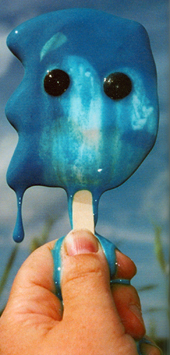A cookie works for a few minutes. An animated sponge and a couple of well-meaning monsters pass the time until the final credits bring a howl of despair. The stuffed pig from FAO Schwarz provides some comfort, though a fruitless search for a duplicate since Schwarz went bankrupt only magnifies the dreaded day when the pig goes missing for good.

I want my son to be happy. But cookies and missing pigs only prove how fitfully temporal these measures are. So what will it take? I’m quite sure the answer doesn’t lie at Toys R Us.
My father was a quiet man who spent thirty years working at a bookstore and volunteering at a local nature preserve. But from 1943 to 1945 he was a lieutenant with the Thirty-sixth Division as it fought its way through Italy and France into the heart of Germany. Though he did not speak much of the war when we were children, the medals he gave my mother when they married hinted at bravery. An officer who served with him told me a story when I called to inform him of my father’s death. Their company was in the Vosges Mountains, on the border between Germany and France. They knew the Germans would put up a fierce fight, since the mountains were the last line of defense before the Allies entered Germany. My father’s unit waited in their foxholes for the attack. Then, in the first gray light of dawn, they saw a vast line of Germans advancing toward them in the mist. “Oh, to be in England, now that the Germans are here,” my father said, and soldiers laughed at his lift from Robert Browning.
He came home from the war to his job in the bookstore where, for a while, he was responsible for hiring and firing. Having seen firsthand what Nazi bigotry had wrought, he had no room for anything but quiet tolerance. Though he never once preached it, I think the fact that I am physically unable to utter a racial epithet came from his determination to view people according to their abilities.
Courage. Resourcefulness. Grace under fire. An open mind. When I think of what would be of value to my son’s happiness, these are the qualities that come to mind. But how to deliver them?
It might help to know what happiness is. Buddha said, “Those who practice the diminishing of desires thus achieve a mind of contentment having no cause for either grief or fear and, finding the things they receive are sufficient, never suffer from want … Those who are contented are happy even though they have to sleep on the ground. Those who are not contented would not be so though they lived in celestial mansions.”
The First Panchen Lama said, “The naive work for their aims alone, while the Buddhas work solely for the benefit of others.” Who do you suppose is better off?
Contentment and a casting off of naive self-indulgence seem to be part of the formula for happiness. How can I foster contentment in a town where spiraling real estate prices and celestial mansions seem the order of the day? We could go sleep on the ground, but my son’s only two, and I’d likely wake up with a backache. It’s obviously the attitude that makes the difference. Now we’re getting somewhere. I used to wonder what love and compassion had to do with enlightenment. One seemed to rest entirely on feeling, while the other was a question of reasoned insight. What business did one really have with the other? But if the Buddha were indifferent to our suffering, why would he bother to explain the path to contentment? When I see my little fellow with his tears and smiles, indifference seems an insult to intelligence. How can I be happy while he is suffering? Clearly, we’re in this together.
I’ve served for a number of years as a volunteer fireman in the little town where I spend part of each week. I’ve walked or, more often, crawled into a number of burning buildings. There is a moment when I’m geared up outside, with the smoke pouring out the windows, when it’s clear to me that if someone has to go in, it might as well be me. It has always been an oddly peaceful feeling. Whenever that happens, I think of my father and his wry remark as the Germans approached—ready to meet his fate. Maybe it’s something I can pass along to my son.
Contributing editor Mark Magill’s most recent book is Why Is the Buddha Smiling?